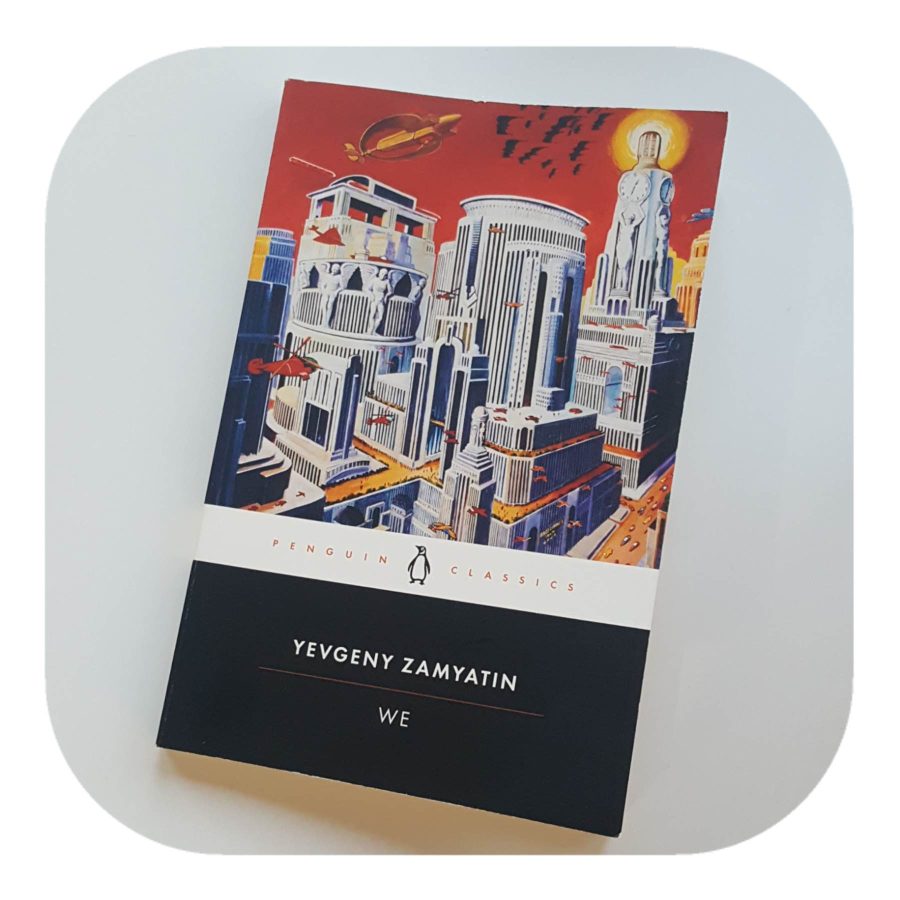Yevgeny Zamyatin was a Russian author born in February 1884. He studied engineering for the Imperial Russian Navy, lost his faith in Christianity, became an Atheist and a Marxist, and joined the Bolshevik faction of the Russian Social Democratic Labour Party. Zamyatin used literature to satirize and criticise the Soviet Union for its enforced conformity and totalitarianism.
‘We’ is his most famous novel and was the first work banned by the Soviet censorship board, Zamyatin smuggled ‘We’ to the West for publication. After being blacklisted, Zamyatin left his homeland and died in poverty in Paris in 1937. ‘We’ apparently inspired Aldous Huxley’s Brave New World, Ayn Rand’s Anthem, George Orwell’s Nineteen Eighty-Four, Kurt Vonnegut’s Player Piano, and Ursula K. Le Guin’s The Dispossessed. ‘We’ received a Prometheus Award in 1994.
I have to admit, I read George Orwell’s Nineteen Eighty-Four a few years ago but I haven’t read any of the other works inspired by Zamyatin’s ‘We’. I have copies of Huxley’s Brave New World and Kurt Vonnegut’s Player Piano waiting for me to pick them up, along with a dozen or so other books I’ve been meaning to read. After finishing ‘We’ a couple of days ago, I could definitely see the similarities to George Orwell’s Nineteen Eighty-Four, even down to the individual characters and the decisions they make. The endings of both novels share similarities, although I found Nineteen Eighty-Four’s ending more disturbing.
I’ll try to avoid giving away too many spoilers, but to summarise ‘We’, I found the novel strange, confusing and a bit difficult to follow at times. Though one could argue that the novel starts off rigid, precise and logical, and then descends into chaos and spontaneity as the story progresses, mimicking how the main character’s thoughts and emotions change. ‘We’ is set in a police-state called OneState, ruled by a mysterious figure known as The Benefactor, in a glass city cut off from the wild, outside world; ‘the unalterably straight streets, the sparkling glass of the sidewalks, the divine parallelepipeds of the transparent dwellings…’ The characters can see everyone and everything that is going on with the exception of when the blinds are lowered during the ‘personal hours’. The characters live according to ‘The Table of Hours’ where every hour is mapped out with certain activities that everyone must adhere to, except for the personal hours (16:00 to 17:00 and 21:00 to 22:00). During the novel the main character gladly believes and states that ‘one day all 86,400 seconds will be on The Table of Hours’. Everything from making machines, to creating music and poetry has been worked out with specific formulas, anything which deviates from these formulas is seen as a crime against OneState and the Benefactor.
The citizens of OneState believe and celebrate order, precision and numbers. Certain emotions like ‘Love’ are seen as primitive feelings belonging to distant ancestors and not to the citizens of OneState. ‘OneState mounted an attack on that other ruler of the world, Love. Finally this element was also conquered, i.e., organized, mathematicised…’ Individuality and imagination are also supressed by OneState, the main character states when referring to their ancestors, ‘They could only create by whipping themselves up to attacks of ‘inspiration’ some unknown form of epilepsy’. The citizens ridicule and laugh at reproduced performances from the world before OneState, as it is seen as chaotic, unorganised and distasteful. The control and strict order over their lives is seen as beautiful and the ideal state of happiness.
The novel is written in chapters titled ‘Records’ as the main character records his thoughts and observations about OneState that he hopes will be on ‘the INTEGRAL’, a rocket that will be sent into space carrying OneState’s ideals and principles to other planets. ‘The unknown beings who inhabit other planets – still living, it may be, in the primitive state known as freedom.’ The citizens of OneState believe they are more evolved and superior to their ancestors who had freedom, ideas, and unorganised lives. During the novel the main character is forced to question the ideals of OneState and feels emotions which he concludes must mean he has a soul. He finds himself turning away from order and ‘The Table of Hours’ and doesn’t want to go back to the life he had before, but knows he could be killed for having such thoughts and feelings. However, when OneState come up with a solution to rid its citizen’s of the burden of a soul, the main character avoids it for as long as he can.
‘We’ is an interesting novel and definitely worth reading if you have already read Orwell’s Nineteen Eighty-Four and intend to read the other novels inspired by ‘We’. The novel shows what a society might look like if every moment of our lives were controlled and ordered with little personal space or privacy. It also highlights the view of apparent happiness when compared to control and freedom. The spontaneity of human emotion and how it can’t be controlled without physically altering the human brain and the unnatural behaviour of those without emotions, no matter how painful those emotions may be. The novel gives an insight into the human psyche and what it means to be human, the good and the bad.
